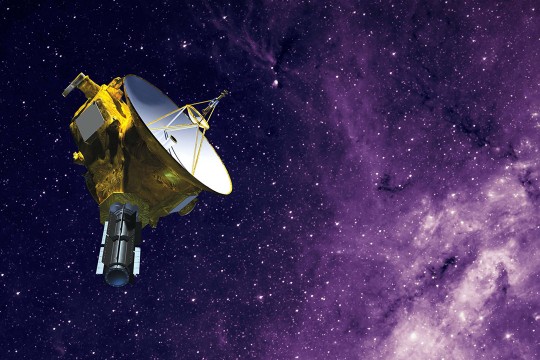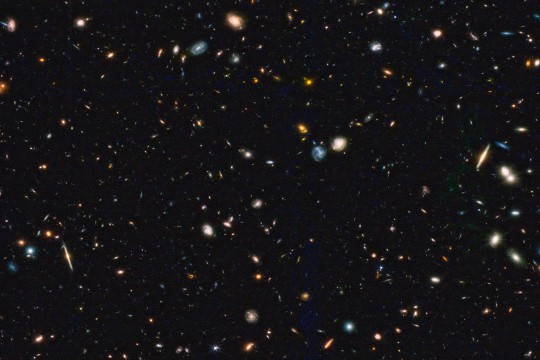News
Astrophysical Sciences and Technology Ph.D.
-
March 10, 2023
![four images of galaxies that show swirls and clumps of stars.]()
First images released from JWST’s largest general observer program
Tech Explorist features the first images from the largest program in the James Webb Space Telescope, COSMOS-Web, co-led by principal investigator Jeyhan Kartaltepe, associate professor in the School of Physics and Astronomy.
-
March 9, 2023
![four images of galaxies that show swirls and clumps of stars.]()
New images from James Webb telescope released, part of RIT co-led research project
WROC-TV features the first images from the largest program in the James Webb Space Telescope, COSMOS-Web, co-led by principal investigator Jeyhan Kartaltepe, associate professor in the School of Physics and Astronomy.
-
March 9, 2023
![four images of galaxies that show swirls and clumps of stars.]()
First images released from James Webb Space Telescope’s largest general observer program
The first images from the largest program in the James Webb Space Telescope’s first year show many types of galaxies. Scientists from the COSMOS-Web program released mosaic images taken in early January by the telescope. COSMOS-Web, co-led by principal investigator Jeyhan Kartaltepe, aims to map the earliest structures of the universe.
-
February 1, 2023
![students wearing eyewear and microphones along with faculty members looking at computer screens.]()
Doctoral offerings keep growing
RIT is growing its Ph.D. offerings, adding one new program in the fall of 2023 and two in 2024. This fall, Saunders College of Business will offer a Ph.D. in business administration. In 2024, the College of Liberal Arts will introduce a new doctoral degree in cognitive science and the College of Science will launch a Ph.D. in physics.
-
January 27, 2023
![Artistic representation of an orange neutron star spitting material into a spinning vortex.]()
RIT scientists reach a milestone in the search for continuous gravitational waves
Scientists on the hunt for a previously undetected type of gravitational waves believe they are getting close and have refined techniques to use in upcoming observational runs. Researchers from the LIGO-Virgo-KAGRA Collaboration outlined the most sensitive search to date for continuous gravitational waves from a promising source in a paper recently published in the Astrophysical Journal Letters.
-
January 9, 2023
![four images of space with 13 insets showing greater detail of celestial elements.]()
James Webb Space Telescope study reveals wide diversity of galaxies in the early universe
New data from the James Webb Space Telescope (JWST) have revealed that the structures of galaxies in the early universe were much more diverse and mature than previously known. RIT Associate Professor Jeyhan Kartaltepe said that JWST’s ability to see faint high redshift galaxies in sharper detail than Hubble allowed the team of researchers to resolve more features and see a wide mix of galaxies.
-
December 16, 2022
![Artist's impression of NASA's New Horizons spacecraft.]()
New study confirms the light from outside our galaxy brighter than expected
In a study led by RIT researchers, scientists analyzed new measurements showing that the light emitted by stars outside our galaxy is two to three times brighter than the light from known populations of galaxies, challenging assumptions about the number and environment of stars are in the universe.
-
December 14, 2022
![three people standing next to a telescope in a lab.]()
RIT researchers receive NSF funding to further develop infrared detectors for astrophysics
The National Science Foundation will award Don Figer, director of RIT’s Center for Detectors and the Future Photon Initiative, more than $315,000 over the next year to continue work on a grant to provide the astronomy community with a new family of detectors that have very large formats, very low cost, and state-of-the-art performance.
-
November 22, 2022
![Various components and wiring of the detectors used for project]()
RIT astrophysicists leverage cancer center to damage single-photon CMOS detectors for future space missions
A recent trip to a cancer center in Boston helped astrophysicists from RIT's Center for Detectors reach a key milestone in their mission to develop advanced CMOS image sensors for future NASA space missions.
-
August 29, 2022
![side-by-side images of the Jewel Bug Nebula, with the left showing purples and blues and the right showing reds, blues, and greens.]()
RIT scientists to study molecular makeup of planetary nebulae using radio telescopes
By using radio telescopes to study sun-like stars in their death throes, scientists hope to reveal important information about the origin of life-enabling chemicals in the universe. The NSF is awarding a $339,362 grant to a team led by Professor Joel Kastner to conduct such a study.
-
August 5, 2022
![Student and professor in lab, looking at computer screen]()
RIT student Lazar Buntic awarded NASA FINESST graduate student fellowship
RIT student Lazar Buntic received a earned a graduate research fellowship through the Future Investigators in NASA Earth and Space Science and Technology program to develop infrared detectors for next generation telescopes.
-
August 4, 2022
![image from a space telescope showing specks and blobs of differing sizes and colors.]()
RIT astrophysicists collaborate on JWST survey yielding wide view of the early universe
New images from NASA’s James Webb Space Telescope show what may be among the earliest galaxies ever observed. The images were taken from the Cosmic Evolution Early Release Science Survey (CEERS), led by a scientist at The University of Texas at Austin. Jeyhan Kartaltepe, an associate professor from RIT, is one of 18 co-investigators from 12 institutions along with more than 100 collaborators from the U.S. and nine other countries.
















